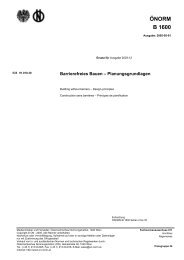- Page 1 and 2:
Oslo 8-11 August 2013DefendingDemoc
- Page 3:
Defending Democracy
- Page 6 and 7:
Defending DemocracyNordic and Globa
- Page 8 and 9:
155Henrik G. BastiansenNorwegian Me
- Page 10 and 11:
Nordicom Review 35 (2014) Special I
- Page 12 and 13:
Nordicom Review 35 (2014) Special I
- Page 14 and 15:
Nordicom Review 35 (2014) Special I
- Page 16 and 17:
Nordicom Review 35 (2014) Special I
- Page 18 and 19:
Nordicom Review 35 (2014) Special I
- Page 21 and 22:
Nordicom Review 35 (2014) Special I
- Page 23 and 24:
Nordicom Review 35 (2014) Special I
- Page 25:
Kirsten Frandsenhas continuously be
- Page 28 and 29:
Nordicom Review 35 (2014) Special I
- Page 30 and 31:
Nordicom Review 35 (2014) Special I
- Page 33 and 34:
Nordicom Review 35 (2014) Special I
- Page 35 and 36:
Natalie Fenton Defending Whose Demo
- Page 37 and 38:
Natalie Fenton Defending Whose Demo
- Page 39 and 40:
Natalie Fenton Defending Whose Demo
- Page 41 and 42:
Natalie Fenton Defending Whose Demo
- Page 43 and 44:
Natalie Fenton Defending Whose Demo
- Page 45:
Natalie Fenton Defending Whose Demo
- Page 48 and 49:
Nordicom Review 35 (2014) Special I
- Page 50 and 51:
Nordicom Review 35 (2014) Special I
- Page 52 and 53:
Nordicom Review 35 (2014) Special I
- Page 54 and 55:
Nordicom Review 35 (2014) Special I
- Page 56 and 57:
Nordicom Review 35 (2014) Special I
- Page 58 and 59:
Nordicom Review 35 (2014) Special I
- Page 60 and 61:
Nordicom Review 35 (2014) Special I
- Page 62 and 63: Nordicom Review 35 (2014) Special I
- Page 64 and 65: Nordicom Review 35 (2014) Special I
- Page 67: Perspectives on Journalism
- Page 70 and 71: Nordicom Review 35 (2014) Special I
- Page 72 and 73: Nordicom Review 35 (2014) Special I
- Page 74 and 75: Nordicom Review 35 (2014) Special I
- Page 76 and 77: Nordicom Review 35 (2014) Special I
- Page 78 and 79: Nordicom Review 35 (2014) Special I
- Page 80 and 81: Nordicom Review 35 (2014) Special I
- Page 83 and 84: Nordicom Review 35 (2014) Special I
- Page 85 and 86: Gitte Gravengaard & Lene Rimestad S
- Page 87 and 88: Gitte Gravengaard & Lene Rimestad S
- Page 89 and 90: Gitte Gravengaard & Lene Rimestad S
- Page 91 and 92: Gitte Gravengaard & Lene Rimestad S
- Page 93 and 94: Gitte Gravengaard & Lene Rimestad S
- Page 95 and 96: Gitte Gravengaard & Lene Rimestad S
- Page 97: Gitte Gravengaard & Lene Rimestad S
- Page 100 and 101: Nordicom Review 35 (2014) Special I
- Page 102 and 103: Nordicom Review 35 (2014) Special I
- Page 104 and 105: Nordicom Review 35 (2014) Special I
- Page 106 and 107: Nordicom Review 35 (2014) Special I
- Page 108 and 109: Nordicom Review 35 (2014) Special I
- Page 110 and 111: Nordicom Review 35 (2014) Special I
- Page 114 and 115: Nordicom Review 35 (2014) Special I
- Page 116 and 117: Nordicom Review 35 (2014) Special I
- Page 118 and 119: Nordicom Review 35 (2014) Special I
- Page 120 and 121: Nordicom Review 35 (2014) Special I
- Page 122 and 123: Nordicom Review 35 (2014) Special I
- Page 124 and 125: Nordicom Review 35 (2014) Special I
- Page 127 and 128: Nordicom Review 35 (2014) Special I
- Page 129 and 130: Alon Lischinsky & Annika Egan Sjöl
- Page 131 and 132: Alon Lischinsky & Annika Egan Sjöl
- Page 133 and 134: Alon Lischinsky & Annika Egan Sjöl
- Page 135 and 136: Alon Lischinsky & Annika Egan Sjöl
- Page 137 and 138: Alon Lischinsky & Annika Egan Sjöl
- Page 139 and 140: Alon Lischinsky & Annika Egan Sjöl
- Page 141: Alon Lischinsky & Annika Egan Sjöl
- Page 144 and 145: Nordicom Review 35 (2014) Special I
- Page 146 and 147: Nordicom Review 35 (2014) Special I
- Page 148 and 149: Nordicom Review 35 (2014) Special I
- Page 150 and 151: Nordicom Review 35 (2014) Special I
- Page 152 and 153: Nordicom Review 35 (2014) Special I
- Page 154 and 155: Nordicom Review 35 (2014) Special I
- Page 157 and 158: Nordicom Review 35 (2014) Special I
- Page 159 and 160: Henrik G. Bastiansen Norwegian Medi
- Page 161 and 162: Henrik G. Bastiansen Norwegian Medi
- Page 163 and 164:
Henrik G. Bastiansen Norwegian Medi
- Page 165 and 166:
Henrik G. Bastiansen Norwegian Medi
- Page 167 and 168:
Henrik G. Bastiansen Norwegian Medi
- Page 169 and 170:
Henrik G. Bastiansen Norwegian Medi
- Page 171:
Henrik G. Bastiansen Norwegian Medi
- Page 174 and 175:
Nordicom Review 35 (2014) Special I
- Page 176 and 177:
Nordicom Review 35 (2014) Special I
- Page 178 and 179:
Nordicom Review 35 (2014) Special I
- Page 180 and 181:
Nordicom Review 35 (2014) Special I
- Page 182 and 183:
Nordicom Review 35 (2014) Special I
- Page 184 and 185:
Nordicom Review 35 (2014) Special I
- Page 186 and 187:
Nordicom Review 35 (2014) Special I
- Page 188 and 189:
Nordicom Review 35 (2014) Special I
- Page 191 and 192:
Nordicom Review 35 (2014) Special I
- Page 193 and 194:
Maria Mattus The Anyone-Can-Edit Sy
- Page 195 and 196:
Maria Mattus The Anyone-Can-Edit Sy
- Page 197 and 198:
Maria Mattus The Anyone-Can-Edit Sy
- Page 199 and 200:
Maria Mattus The Anyone-Can-Edit Sy
- Page 201 and 202:
Maria Mattus The Anyone-Can-Edit Sy
- Page 203 and 204:
Maria Mattus The Anyone-Can-Edit Sy
- Page 205:
Maria Mattus The Anyone-Can-Edit Sy
- Page 208 and 209:
Nordicom Review 35 (2014) Special I
- Page 210 and 211:
Nordicom Review 35 (2014) Special I
- Page 212 and 213:
Nordicom Review 35 (2014) Special I
- Page 214 and 215:
Nordicom Review 35 (2014) Special I
- Page 216 and 217:
Nordicom Review 35 (2014) Special I
- Page 218 and 219:
Nordicom Review 35 (2014) Special I
- Page 220 and 221:
Nordicom Review 35 (2014) Special I
- Page 222 and 223:
Nordicom Review 35 (2014) Special I
- Page 224 and 225:
Nordicom Review 35 (2014) Special I
- Page 226 and 227:
Nordicom Review 35 (2014) Special I
- Page 228 and 229:
Nordicom Review 35 (2014) Special I
- Page 230 and 231:
Nordicom Review 35 (2014) Special I
- Page 232 and 233:
Nordicom Review 35 (2014) Special I
- Page 234 and 235:
Nordicom Review 35 (2014) Special I
- Page 236 and 237:
Nordicom Review 35 (2014) Special I
- Page 239 and 240:
Nordicom Review 35 (2014) Special I
- Page 241 and 242:
Claus Toft-Nielsen Worlds at PlayIn
- Page 243 and 244:
Claus Toft-Nielsen Worlds at Playth
- Page 245 and 246:
The Fantasy Genre MatrixClaus Toft-
- Page 247 and 248:
Claus Toft-Nielsen Worlds at PlayWi
- Page 249 and 250:
Claus Toft-Nielsen Worlds at Playa
- Page 251:
Claus Toft-Nielsen Worlds at PlayYe
- Page 254 and 255:
Nordicom Review 35 (2014) Special I
- Page 256 and 257:
Nordicom Review 35 (2014) Special I
- Page 258 and 259:
Nordicom Review 35 (2014) Special I
- Page 260 and 261:
Nordicom Review 35 (2014) Special I
- Page 262 and 263:
Nordicom Review 35 (2014) Special I
- Page 264 and 265:
Nordicom Review 35 (2014) Special I
- Page 267 and 268:
Nordicom Review 35 (2014) Special I
- Page 269 and 270:
Ulla Carlsson NordMedia ‒ A Vital
- Page 271 and 272:
Ulla Carlsson NordMedia ‒ A Vital
- Page 273:
Ulla Carlsson NordMedia ‒ A Vital
- Page 276 and 277:
Nordicom Review 35 (2014) Special I
- Page 278 and 279:
Nordicom Review 35 (2014) Special I
- Page 280 and 281:
Nordicom Review, Supplent, 33 (2012
- Page 282 and 283:
Nordicom Review, Supplent, 33 (2012
- Page 284 and 285:
Nordicom Review, Supplent, 33 (2012
- Page 286 and 287:
Nordicom Review, Supplent, 33 (2012
- Page 288 and 289:
Nordicom Review, Supplent, 33 (2012
- Page 290 and 291:
Nordicom Review, Supplent, 33 (2012
- Page 293 and 294:
Nordicom Review 35 (2014) Special I
- Page 295 and 296:
Miia RantalaUniversity of Laplandmi
- Page 297 and 298:
Carsten OhlmannOslo and Akershus Un
- Page 299 and 300:
Patrick PraxUppsala Universitypatri
- Page 301 and 302:
Nordicom Review 35 (2014) Special I
- Page 303 and 304:
Nordicom ReviewNotes to Contributor





